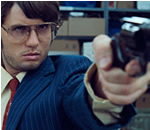The Killing of John Lennon (Andrew Piddington)
“I was Mr. Nobody until I killed the biggest somebody on earth.”
Sure, it’s the tagline of the new film, “The Killing of John Lennon.” But it was line in the film that rang loud in my head, because it speaks volumes about the state of mind of Mark David Chapman. The man who would use his .38 caliber to shoot John Lennon dead the night of December 8, 1980 just outside the Dakota in New York City.
The film goes back three months prior to that date, taking us into Chapman’s world through his own words, a narration taken from his journals and statements. It as if he’s giving us his own biography, a camera pointed from the inside out instead of the other way around.
We learn that after being raised in Georgia, he now lives in Hawaii as a graveyard shift security guard. One also imagines what his childhood was like, as he spots his mom picking up men 30 years her junior while on the beach, or seeing Chapman’s internal fantasies of shooting his own father in the head. And then there’s the almost possessive relationship he has with his submissive wife.
In the true spirit of independent film, the art house flavor appears during when Chapman goes into his fantasy world, as he did when he re-discovered what would soon be his driving force of destiny, the 1945 novel, The Catcher in the Rye. It’s as if he’s been reborn in a religious experience.
It’s at this time that you forget that this is a feature film and Jonas Bell isn’t really Mark David Chapman. You’re so pulled in, it’s like you’re in the story, an accomplice of sorts.
At the beginning of the movie, he makes a retrospective statement, “You can’t find your identity by looking for it.” In his case, and in his mind, his identity would be found within the identity of John Lennon. The more he found out about Lennon, the more the hypocrisy angered him. A man who sang about and imagined living free and with nothing, had houses, a ranch, and a huge area of the Dakota in New York City.
Chapman pushes aside his wife and the concerns of his mother, and set out for New York City, just like his hero of the story, Holden Caulfield.
Now, his aimless life had a purpose. He would repeat his anthem, “The phony must die, said the catcher in the rye. The phony must die, said the catcher in the rye,” as the cinematography mimicked the cells that fired off in his brain.
Although it’s clear that Chapman was off his rocker, he was calculated and precise in how he carried out his plans. He almost mocks two young girls he chats up in front of the Dakota. As they walk away, he impersonates their future surprise at learning how such a nice guy could have killed John Lennon.
When the time finally came, time stands still as Chapman is almost outside of himself, whispering, “It was like I was in a movie.” The only thing he didn’t say was, “and I was the star.” He didn’t run. He stood still, holding The Catcher in the Rye up to the night sky in the same way a preacher would while leading his ministry.
He would become the star after his arrest, as he manipulated everyone around him, including himself, believing that he had become a hero in his own time, spurning all to read his bible by J.D. Salinger.
John Lennon’s last interview took place on December 8, 1980 (http://www.youtube.com/watch?v=2ulghD5JkmU), the day he would meet his fate, and it was as if he had a premonition. His recorded voice explains the difficulty of being a pop star, where he didn’t feel like he could be himself. Listening to him speak, “One cannot be absolutely oneself in public. I tried to retain myself throughout it, but not being always successful at that. It became like being a politician.”
Like being a phony. But we know that people in those positions don’t really have any other choice, and some have chosen to make themselves less available to the public by living in more remote parts of the country other than Los Angeles or New York.
In the film, the filmmakers used another clip of Lennon’s where he boasted about the fact that he was able to walk on the streets of New York and no one would bother him, at least not the way fans had in his homeland of England. And it was this openness he had that would eventually lead to his death.
The life of a celebrity has become a much larger part of our culture since 1980. At the same time, we have a generation of children on prescription drugs for a variety of emotional issues, who will eventually grow up to be adults. And some of those have not waited to grow up to take another person’s, or several people’s lives. It’s a scary predicament if one really thinks about it for more than a moment.

